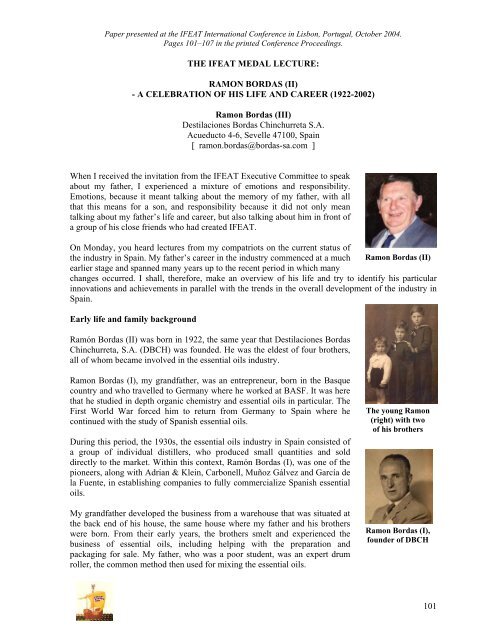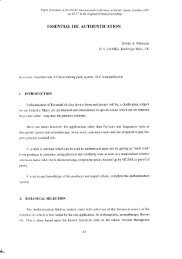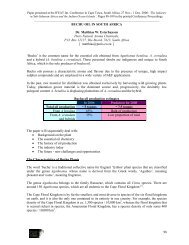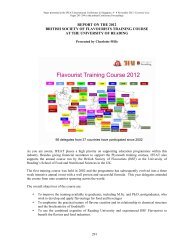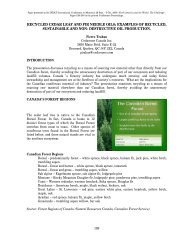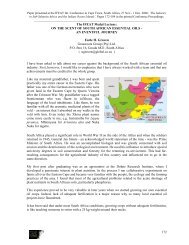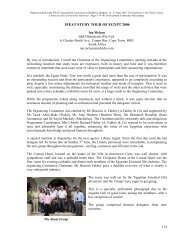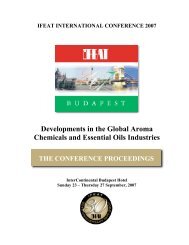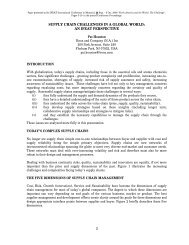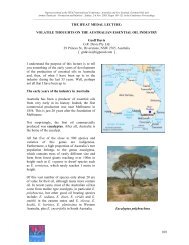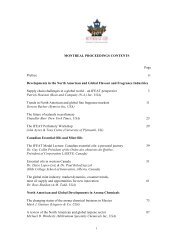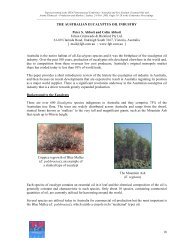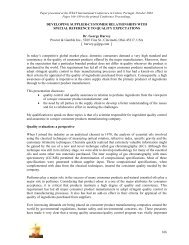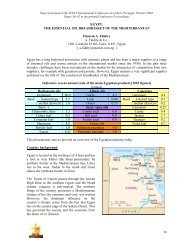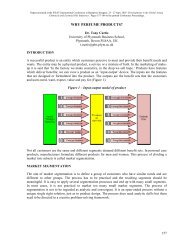THE IFEAT MEDAL LECTURE: RAMON BORDAS (II) - A ...
THE IFEAT MEDAL LECTURE: RAMON BORDAS (II) - A ...
THE IFEAT MEDAL LECTURE: RAMON BORDAS (II) - A ...
Create successful ePaper yourself
Turn your PDF publications into a flip-book with our unique Google optimized e-Paper software.
Paper presented at the <strong>IFEAT</strong> International Conference in Lisbon, Portugal, October 2004.<br />
Pages 101–107 in the printed Conference Proceedings.<br />
<strong>THE</strong> <strong>IFEAT</strong> <strong>MEDAL</strong> <strong>LECTURE</strong>:<br />
<strong>RAMON</strong> <strong>BORDAS</strong> (<strong>II</strong>)<br />
- A CELEBRATION OF HIS LIFE AND CAREER (1922-2002)<br />
Ramon Bordas (<strong>II</strong>I)<br />
Destilaciones Bordas Chinchurreta S.A.<br />
Acueducto 4-6, Sevelle 47100, Spain<br />
[ ramon.bordas@bordas-sa.com ]<br />
When I received the invitation from the <strong>IFEAT</strong> Executive Committee to speak<br />
about my father, I experienced a mixture of emotions and responsibility.<br />
Emotions, because it meant talking about the memory of my father, with all<br />
that this means for a son, and responsibility because it did not only mean<br />
talking about my father’s life and career, but also talking about him in front of<br />
a group of his close friends who had created <strong>IFEAT</strong>.<br />
On Monday, you heard lectures from my compatriots on the current status of<br />
the industry in Spain. My father’s career in the industry commenced at a much Ramon Bordas (<strong>II</strong>)<br />
earlier stage and spanned many years up to the recent period in which many<br />
changes occurred. I shall, therefore, make an overview of his life and try to identify his particular<br />
innovations and achievements in parallel with the trends in the overall development of the industry in<br />
Spain.<br />
Early life and family background<br />
Ramón Bordas (<strong>II</strong>) was born in 1922, the same year that Destilaciones Bordas<br />
Chinchurreta, S.A. (DBCH) was founded. He was the eldest of four brothers,<br />
all of whom became involved in the essential oils industry.<br />
Ramon Bordas (I), my grandfather, was an entrepreneur, born in the Basque<br />
country and who travelled to Germany where he worked at BASF. It was here<br />
that he studied in depth organic chemistry and essential oils in particular. The<br />
First World War forced him to return from Germany to Spain where he<br />
continued with the study of Spanish essential oils.<br />
During this period, the 1930s, the essential oils industry in Spain consisted of<br />
a group of individual distillers, who produced small quantities and sold<br />
directly to the market. Within this context, Ramón Bordas (I), was one of the<br />
pioneers, along with Adrian & Klein, Carbonell, Muñoz Gálvez and García de<br />
la Fuente, in establishing companies to fully commercialize Spanish essential<br />
oils.<br />
My grandfather developed the business from a warehouse that was situated at<br />
the back end of his house, the same house where my father and his brothers<br />
were born. From their early years, the brothers smelt and experienced the<br />
business of essential oils, including helping with the preparation and<br />
packaging for sale. My father, who was a poor student, was an expert drum<br />
roller, the common method then used for mixing the essential oils.<br />
The young Ramon<br />
(right) with two<br />
of his brothers<br />
Ramon Bordas (I),<br />
founder of DBCH<br />
101
The first products that the Bordas Company produced and sold during this period were the classic<br />
Spanish essential oils:<br />
• Spike lavender • Rosemary • Sage<br />
• Fennel • Eucalyptus • Pennyroyal<br />
The first diversification of the product range was made by production of terpeneless oils and of esters<br />
for nitrocellulosic paints (ethyl acetate, butyl acetate and amyl acetate).<br />
Ramón did not get involved formally in the industry until the mid-1940s. Although these were difficult<br />
times, following on from the Spanish Civil War and the Second World War, the essential oils business<br />
in Spain was flourishing. During these years, when Ramón was around 22 years old, he travelled<br />
throughout Spain, becoming acquainted with each and every one of the locations where oils were<br />
produced - from the spike lavender area in Guadalajara to the traditional rosemary, thyme and<br />
origanum areas on the Mediterranean coast.<br />
During his years in Germany, my grandfather met people in the essential oils trade who, later, moved<br />
to the United States. He insisted upon Ramón travelling to the United States to visit these friends and<br />
to try to sell oil. These were the times of Fritzsche Dodge Olcott, Lever Bross, J. Manheimer, Furth<br />
and Morris J. Golonbeck. Ramon arrived in the USA with a consignment of stock that had been built<br />
102
up over more than two years and sold it all in four months. This was Bordas’ first important business,<br />
and Ramon´s particular one, and the profit funded investment in a new factory at Carretera de<br />
Carmona, which operated from 1950 until 2002.<br />
Progression to a Captain of Industry<br />
The essential oils industry continued growing, to such an extent that Ramon had to look for<br />
alternatives for the production in other Mediterranean countries, such as Morocco, where there was a<br />
growing production of essential oils. A Bordas company was established in Morocco and Ramon spent<br />
long summers along the coast between Tangiers to Larache. He distilled there up to up to 150 tonnes<br />
of pennyroyal and 75 tonnes of Moroccan rosemary.<br />
During this period my father met and travelled<br />
throughout Morocco and Spain with the<br />
renowned Ernst Günther, a close friend of my<br />
grandfather. They visited all of the distillation<br />
locations in both countries. In his industry<br />
‘Bible’, The Essential Oils, Ernst makes<br />
continuous references to Ramón and to my<br />
grandfather when describing the Spanish essential<br />
oils. We can see him in this photo taken by my<br />
father in Brazil.<br />
Guenther, photographed<br />
in Brazil by Ramon<br />
At the new installations, DBCH began making<br />
essential oil derivatives, including anethol,<br />
menthol, citronellol and its esters, geraniol and its<br />
esters and those of clove. Laevo-menthol as a<br />
derivative of essential oils deserves special<br />
comment because DBCH was a pioneer in the<br />
isomerization of l-menthol from the iso-pulegone<br />
in pennyroyal oil. The company distilled up to<br />
300 tonnes of pennyroyal oil in its Moroccan and<br />
Spanish plants as a feedstock for the production<br />
of up to 150 tonnes of l-menthol. This tradition of<br />
the production of l-Menthol is still maintained<br />
today<br />
103
At the beginning of the 1960s, DBCH began one<br />
of the activities which most has characterized the<br />
company: the development of bitter orange<br />
derivatives and, in particular, the concentrates for<br />
marmalades and juices that are so favoured by the<br />
British market. This led to a close and long<br />
lasting friendship with the major British and<br />
European manufactures of marmalades, a<br />
business relation that continues today. This<br />
activity began simply as the commercialization of<br />
the orange fruit harvested in the Seville area and<br />
exported directly to the United Kingdom. However, it progressively evolved to the point of making the<br />
bitter orange marmalades and concentrates with the brands of third parties and, today, approximately<br />
15 million kilograms of oranges are transformed into derivatives by DBCH.<br />
A parallel development was the distillation of neroli blossom and petitgrain leaves for the traditional<br />
perfumery markets; a business that was very important in Ramon’s life. He was a key player in the<br />
commercialization of bitter orange, and he always gave it a very distinguishing character within the<br />
UK market.<br />
For Spain, the 1970s were a period of great development and consolidation in the market of essential<br />
oils and their derivatives. Traditional essential oil distillers, such as Muñoz Galvez, Daksa and García<br />
de la Fuente, consolidated their position on the<br />
European market. Acedesa, exclusive producer of<br />
essential oils derivatives and of aroma chemicals,<br />
joined this family.<br />
In the particular case of Bordas, this meant the<br />
expansion in the production of turpentine<br />
derivatives: terpineol, terpenyl acetate,<br />
dihydroterpineol and terpinolene.<br />
These years, also, saw the greatest historical<br />
volume of essential oil production by Spain.<br />
I remember going with my father when I was around four or five years old to the fields of Guadalajara,<br />
Granada, Murcia, Almeria and Cádiz during the summer and visiting each and every one of our field<br />
distillers. We came to have up to 120 boilers dispersed throughout Spain. The dominance that Bordas<br />
had in the commercialization of Spanish essential oils arose from my father’s unquestionable charisma<br />
with the farmers and to his warm, sincere and easy relationships towards all of our field distillers. A<br />
simple handshake at the end of the summer was good enough to do business. Today, old distillers still<br />
retell stories of the summers they passed with my father. The Spanish essential oils business has<br />
always been based on the trust between people. In this sense, the influence Ramon had amongst our<br />
field distillers, due to his honest and straightforward character was fundamental.<br />
This period of consolidation of the production of oils was paralleled by the adoption of new<br />
technologies. Sulzer a Swiss company specialized in column packing, brought out the filling BX,<br />
104
which was revolutionary in the world. These<br />
packings, due to their high efficiency and high<br />
production capacity, gave the possibility to<br />
separate aroma chemicals that up to that time had<br />
been difficult.<br />
This new technology made it possible for DBCH<br />
to commercialize more turpentine derivatives,<br />
such as bornyl acetate, fenchyl acetate and<br />
camphene in their pure qualities; and also methyl<br />
cedryl ketone from cedarwood and heliotropine<br />
from sassafras.<br />
The late seventies through to the nineties under Ramon’s leadership were years of great expansion and<br />
prestige for the Bordas Company, when the position as one of the main suppliers of aroma chemicals<br />
and essential oils was consolidated.<br />
The 1980s also included a big expansion on the international canvas as a producer:<br />
• A subsidiary, Socidestilda, was opened in Portugal in order to maintain our leadership in<br />
the production and commercialization of eucalyptus oil and its derivatives. In this plant,<br />
up to 500 tonnes of oil was produced each year.<br />
• Evesa, in the south of Spain and close to Gibraltar, was opened to produce paprika<br />
oleoresin, labdanum and oakmoss derivatives by solvent extraction. Today, more than 20<br />
years later, this company is the leading producer of paprika oleoresin in the world and<br />
holds more than the 30% of the global market share.<br />
• In Brazil, another subsidiary, Geroma do Brasil, started to manufacture heliotropine. The<br />
annual output is up to 300 tonnes and this plant we has supplied every single company in<br />
this industry over the years. Also, the plant has been expanded to produce the same<br />
turpentine derivatives, such as pinene and myrcene, as is in done Seville and, today, it is<br />
our main logistic arm to supply the growing South American market.<br />
105
Ramon and <strong>IFEAT</strong><br />
No discussion of my father’s life and career is complete if it excludes his association with <strong>IFEAT</strong>. He<br />
was not only one of the first members of <strong>IFEAT</strong> on its creation in 1977 but also the first President of<br />
the Federation and he continued as an active member of the <strong>IFEAT</strong> Executive Committee thereafter.<br />
For my father, his relationship with many other members of <strong>IFEAT</strong> was of personal and profound<br />
friendship, rather than mere business. His enthusiasm and enjoyment of participating in <strong>IFEAT</strong><br />
activities may be seen in the photographs below of work and play in <strong>IFEAT</strong>.<br />
The entire family were drawn by my father into the <strong>IFEAT</strong><br />
experience and it became a part of our lives. This is especially true<br />
of my mother, Maria, because she lived through and participated in<br />
the early period of <strong>IFEAT</strong>’s evolution.<br />
This family experience culminated with the <strong>IFEAT</strong> Conference of<br />
1997 in Seville, for which my father was Chairman of the<br />
Conference Organizing Committee.<br />
All of the family were involved in one way or another with this<br />
event but none of us matched the inputs of Arantxa and without<br />
whom the conference would not have been such a great success.<br />
106
Ramón passed away on January 4 th , 2002 leaving behind almost 60 years dedicated to the industry, a<br />
whole lifetime. At that time, Destilaciones Bordas Chinchurreta had just completed the great challenge<br />
of the last years, the move of our installations from Carretera de Carmona to outside of the city. This<br />
challenge was lived by my father with his usual dynamism, going every single day to see the evolution<br />
of the construction of one of the most modern and innovative plants of this industry worldwide.<br />
Ramon’s professional legacy was a company that employs over 300 people, has three international<br />
production centres and exports to over 600 customers in 70 countries. However, we must not forget his<br />
wider commitment and enthusiasm to life and to people, he was always generous in helping anyone in<br />
need.<br />
In this age of technology and computers, I make a plea to maintain the spirit my father, Ramon, had in<br />
the business world, a spirit he shared with many of those who are here today. It is the spirit of trust<br />
amongst people, the spirit of cordiality, the spirit of respect and the spirit of loyalty in business. All of<br />
these young people, like Fernando and myself, who are entering into this marvellous industry must be<br />
reminded that many of those who are here today have done and will continue doing business with this<br />
spirit.<br />
Ramon Bordas (<strong>II</strong>I) was born in 1967. His tertiary education was spent at the<br />
Valencia Polytechnic University, where he graduated as a chemical engineer.<br />
In 1992, he became a third generation member of the family company. Today,<br />
Ramon is the Executive Vice President and Chief Operations Manager of<br />
Destilaciones Bordas Chinchurreta SA.<br />
107


